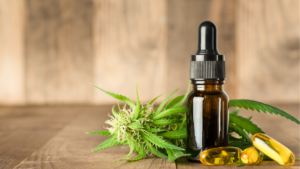A new year allows us the opportunity to reflect on the past year to understand what we want to let go of and what we want to prioritize in the year ahead. One priority that many have at the top of their list is improving individual mental health wellness with natural remedies. To aid in that journey to become the best versions of ourselves, we have gathered up key guidance and resources on how cannabinoids such as cannabidiol (CBD) may benefit us from the inside out.
Being consistent in the short-term for long-term goals
Among the questions we receive, one of the more frequently asked is how and when to take CBD products. When it comes to your therapy, consistency is key to successful results. For CBD in particular, this is for a couple of reasons.
First, CBD has a low bioavailability and a short half-life. Consistent dosing 2-3 times daily may allow CBD, among other minor cannabinoids, to remain present in your body to offer the beneficial effects you are looking for. While the amount you take and how often you dose is highly dependent on your specific needs and situation, a Realm of Caring care specialist is here to help with free one-on-one support to help find what is right for you.
Secondly, given that CBD has low bioavailability and a fairly short half-life. It may take time for the cannabinoids to fully present themselves and for the benefits to be revealed to the consumer. Therefore it is advised to be patient before increasing the amount you are taking. Increasing too much too soon may lead to undesired effects while taking too little may provide no benefit. The key is to find your individual, therapeutic dose.
Implementing self-care rituals
Engaging in a self care routine has been clinically proven to reduce or eliminate anxiety and depression, reduce stress, improve concentration, minimize frustration and anger, increase happiness, and improve energy.
There is a continuous need to seek more efficient, safer, and widely available methods to treat medical conditions, skin pathology included. Topical use of cannabis as a form of therapy covers a wide scope of skin disorders due to anti-inflammatory, anti-itching, wound healing, anti-microbial, and anti-proliferative effects.
Elements of the ECS have been discovered in the skin, to include our skin’s immune system. Through interaction of the receptors in our skin layers, cannabinoids have shown through research to alter pain, stimulate wound healing, and alleviate itch. These studies may add a different dimension on how we see the treatment of several skin diseases.
Of the cannabinoids researched to date for skin health, CBD is a widespread ingredient in skin care products formulated as body oils, moisturizers, salves, lotions, and balms. Delta-9-Tetrahydrocannabinol (THC), and potentially cannabinol (CBN), may also be responsible for skin benefits such as reducing cytokine production and oxidative stress. Additionally, cannabigerol (CBG) has powerful anti-inflammatory and antibacterial properties that may add benefit to our skin health.
Keeping your gut in check
Our gut health is a complex ecosystem, composed of over 1,000 microorganisms. These microorganisms have significant roles in our daily energy uptake by breaking down complex carbohydrates into simple sugars. They also impact our immune system and imbalances of the gut may contribute to weight fluctuations, obesity, food sensitivity and more.
In addition, you may be familiar with the brain-gut connection (sometimes referred to as gut-brain), which helps us to understand how functional bowel problems and bowel disorders such as Irritable Bowel Syndrome (IBS) may be responsible for sending signals to the central nervous system that trigger mood changes, leading to anxiety and depression.
The ECS performs protective activities in our gastrointestinal (GI) tract and shows promise as a therapeutic target against bowel disorders such as IBS, Crohn’s disease, irritable bowel disease (IBD), and motility-related conditions. The main role of the ECS in the GI tract is controlling intestinal hyper-contractility, modulating visceral sensations, intestinal inflammation, and brain-gut communication.
A significant population of individuals suffering with IBD use cannabis to relieve symptoms of pain, nausea, and appetite, as well as to improve their overall mood. THC has been shown through anecdotal evidence to improve abdominal spasms, cramps, and visceral pain; whereas CBD may contribute to the relief of intestinal inflammation, modulating cortisol and metabolism, improve the immune response of the gut, and alleviate the anxiety and stress associated with gastrointestinal discomfort. In a 2021 review of 682 studies of cannabinoid use for IBD patients, clinical symptoms (abdominal pain, general well-being, nausea, diarrhea, and poor appetite) were all improved with cannabinoid therapy.
Fostering clarity and focus
Proper cognition and energy levels throughout the day can be attributed to healthy sleep. CBD is among those cannabinoids that may help eliminate brain fog during the day, while also improving our sleep quality during the night.
CBD has therapeutic properties that have the potential to mitigate symptoms that interfere with sleep. It also has the potential to improve sleep-wake cycles leading to an increase in the percentage of total quality sleep overtime.
Prolonged CBD therapy has shown positive improvements in psychological symptoms and cognition. Currently, using cannabinoids to benefit neurological issues and serve as a neuroprotectant is being studied. The antioxidant properties of cannabinoids, such as CBD, may have the ability to provide neuroprotection. As well, research is showing that elevation of cannabinoid receptor activity could potentially slow down the progression of brain aging and alleviate symptoms associated with neurodegenerative disorders, therefore cannabinoids with the ability to activate receptors may provide these additional benefits.
Additional ingredients in your cannabinoid product may also enhance cognitive function in your day to day. For example, lemon balm is known to improve mood, cognition, and aid as a natural anti-inflammatory, anti-oxidant, and decongestant. Combining CBD and lemon balm may calm the nervous system to ease stress, refocus energy, and relax. The functional mushroom, lion’s mane, is another ingredient known to have a host of benefits for neurodegenerative diseases such as ischemic stroke, Parkinson’s, Alzheimer’s, and depression. It may also promote recovery and enhance nerve regeneration, therefore improving cognitive performance and reducing brain fog.
Finding support
When looking to cannabis for medical conditions, we always recommend speaking with a healthcare professional. However, if you are in need of support while on your journey we are here to help. From product selection to dosing guidance to answering questions your family has about your decision to choose cannabis – we are here every step of the way. Send as an email to [email protected], call us at 719-347-5400 or chat with us at realmcaring.org.





